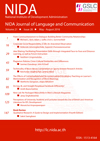The Effects of Contextualized and De-contextualized Vocabulary Teaching on Learners’ Memorization and Recognition of Word Meanings
Keywords:
contextualized vocabulary teaching, de-contextualized vocabulary teaching, English language teaching, word recognition, word memorizationAbstract
When learning English as a Foreign Language (EFL), learners are expected to broaden their lexical repertoire not only to learn and to be able to use unfamiliar words, but also to develop other language skills. This study investigates the effects of contextualized and de-contextualized vocabulary teaching on learners’ memorization and recognition of word meanings, and to evaluate the learners’ attitudes towards the two strategies for teaching vocabulary. Data were collected with two sets of instruments: a test and a delayed test, and an attitude questionnaire. The participants were 39 students, aged 12-13 years old who were studying at a local school in Phetchaburi province in Thailand. The results show that the de-contextualized technique is more effective than the contextualized technique in helping the learners to achieve vocabulary memorization. However, the contextualized technique outperforms the de-contextualized technique in developing vocabulary recognition. The research findings have implications for vocabulary teaching in that word meanings should be taught in isolation as well as in context to focus on both the language features and the appropriateness for use in daily life.
Downloads
How to Cite
Issue
Section
License
By submitting a manuscript, the author transfers the copyright for the article to School of Language and Communication, National Institute of Development Administration (NIDA), if and when the manuscript is accepted for publication. Though the journal is an open-access, reproduction of any material published in NIDA Journal of Language and Communication for non-personal and/or commercial purpose requires a written permission from School of Language and Communication, National Institute of Development Administration (NIDA).






